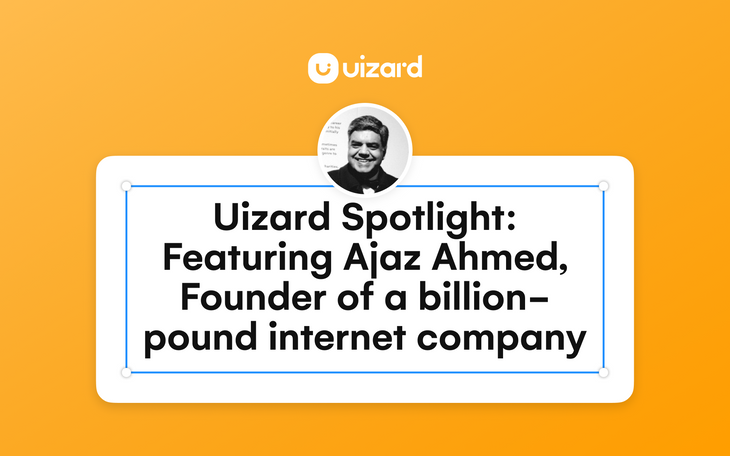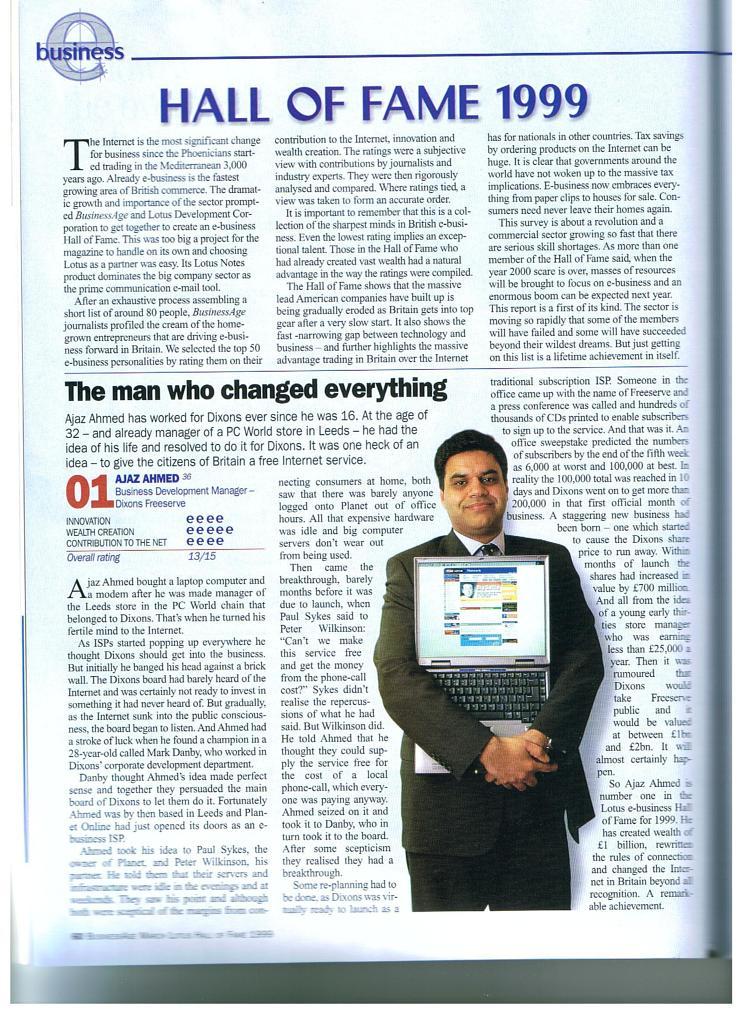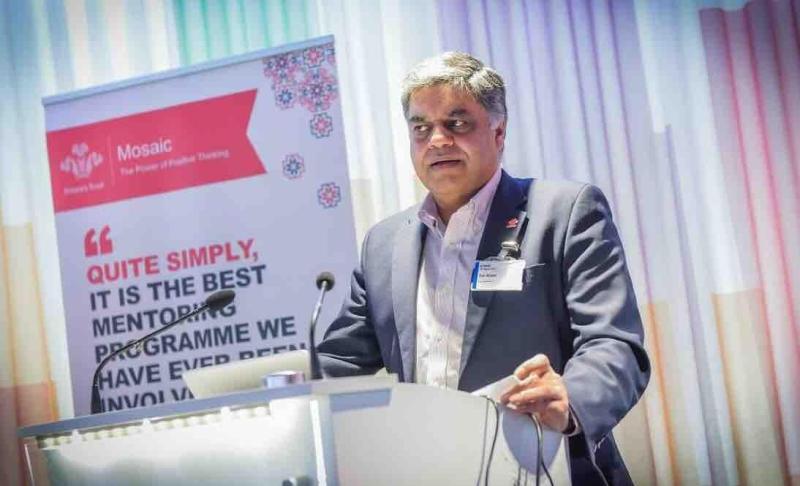Featuring a Uizard member: Ajaz Ahmed, founder of Freeserve, the UK's first billion-pound internet company

TLDR;
- Ajaz Ahmed is the founder of Freeserve, the UK's first billion-pound internet company. Ajaz's journey started during the internet boom of the late 90s, during which he created Freeserve to revolutionise user accessibility to browser-based internet services
- We talk about Ajaz's latest exciting venture, web technology company Quba. Quba builds big websites for big companies!
- Ajaz shares insights into his biggest successes and his past failure, to help inspire fellow Uizard community members on their journey to success.
This series profiles the most important part of Uizard, our community. Today’s featured interview is with Ajaz Ahmed, founder of Freeserve, the UK's first billion-pound internet company.
Hi Ajaz! It’s an honor to be sitting with you here today. Can you tell us a little bit more about your work in Freeserve?
Sure! An awful lot of people that are younger, they won't know that there was a life before the internet, and that you didn't have WiFi or broadband. So in 1998, I heard about this thing called the internet. I thought I wanted to go on the internet. To my surprise, no one could tell me how to get onto the Internet. And eventually, someone told me: “you should try this internet company. They're really good.”
So I phoned up the company. And I said, you know, “I want to go on the Internet, how do I get on the internet?” And he said, “You need a browser.” And I said, “How do I get a browser?,” to which he said, “You can FTP from our site.” And I thought, “What the hell is an FTP?” I now know it stands for File Transfer Protocol – but in order to download it, you’ve got to be on the internet. So I gave up on that.
Eventually, I heard about a company called CompuServe, which was a big American company. I installed CompuServe onto my computer. And when I got onto the internet, I thought, “wow, this is fantastic. In the future, everyone is going to want to go on the internet.” And then I started thinking about my experience. Every day, thousands and thousands of people must be asking us how to get the internet. And we turn around and say, “We don't know.” If we become the internet service provider, then we'll be able to do something that none of the other companies are able to do, which is talk to the customer, because the customer is already in front of us. You won't need to FTP from anywhere, and then we'll also have control of the homepage so the first thing the customer sees will be our homepage; our portal will be built to make money from the search engine, from the shopping channel, and things like that.
I thought it was a great idea, so I went to see the CEO of PC World and told him about my great idea. And he said, “No, not interested.” A little later, there was a Vanity Fair article with people like Bill Gates, Steve Jobs, Ted Turner, and people like that. And the article said, “in the future, the new establishments are going to be the people that control content and technology.” In this article, this guy said, “what these people are required to do is do the obvious before it becomes obvious to everyone else. Because by the time it becomes obvious to everyone else, it's too late. Because people like them have done it. And the other guys haven't.” So with that, I carried on and insisted on my idea.
On the 22nd of September 1998, which sounds like a long time ago, Freeserve launched on the business model that we're going to give the internet away for free. And within three months, we were the largest ISP in the country. And the incumbents, which were AOL and CompuServe, which no longer exist, were going out of business in the UK. Nine months later, we floated it on the stock exchange in London and in New York, for 1.5 billion GBP, and then the price kept going up. At one point, we were worth 9 billion GBP, and then our share price started to go down. We sold Freeserve to France Telecom, 3 years after we launched, for 1.6 billion GBP.
So, the effect of all of this was there was an awful lot of people who were using the internet for the first time. But because there were so many people on the internet, then there was a market for people selling products and services. It really kickstarted the whole dot com boom. Freeserve was the first thing that many people did the first time they went on the internet. It really changed everything in the UK.

That’s amazing. The repercussions of Freeserve is definitely something that affects us to this day. It's such a great story. Can you also tell us a bit more about your new venture, Quba?
Yeah, so I’m the chairman in Quba, and we build websites. But we don't build normal websites, which are WordPress sites. We build big websites. We’re a web technology company, essentially. This is a very important thing that founders need to hear: we're in the process of pivoting, because the internet is going through lots of change. So we need to change as well, we need to change the type of technologies that we offer, the services that we offer to include the cloud and artificial intelligence, among others. So that’s what Quba is really for – building complicated websites for big companies, such as insurance companies, finance companies, or airports.
Was it through your work in Quba that you found Uizard?
Sort of. One of the things I always like to do is keep up with new technologies and new players. There's no point being in the business and not knowing what's happening in technology. So I read about Uizard, and before I take the time to actually register or download something, I always like to read about it.
I read about Uizard, and it sounded really, really good so I signed up to it. And I found out the way it worked and how easy it was to use. It was great. I thought lots of companies should be doing this sort of thing. Instead of paying someone to design a website, they could do it themselves, because it actually is very, very easy, and Uizard is a proper cloud-based technology.
That’s really nice to hear. Thanks, Ajaz.
Now, I’ll jump onto the questions that our entrepreneurs and founders in the Uizard community have been asking. First, what do you think has been the biggest factor that's helped you in your career as a founder?
The biggest one is the fact that from a young age, I wanted to be an entrepreneur. I didn't want to carry and do a 9 to 5 job. One of the things that motivated me to do that, was an advert that I saw on television for a bread company. And you're probably wondering how bread can motivate someone. In this ad, there's an old guy, and he's leaving a factory. He walks, and he sits down, and he's got a clock under his arm, and then he looks at the factory for one last time.
And I thought “oh my gosh, that guy has worked his entire life in that mill. What he's got to show for it is a clock.” And I thought, lots of people must be sitting down and thinking about all the things that they should have done before they retired. I want to be able to look back and say I made a difference. When I left a company that I used to work for, they bought me a clock. It’s very meaningful. This reminds me that if I'd have worked there another 20 years, all I probably would have gotten is a clock. Whereas now, I can sit down and look back and reflect on my life and say, I actually made a difference.
So that's what people should do: they should be determined that when they retire, they can look back and say they made a difference.
And then it's no good just actually dreaming about doing something. You've got to have the tools to do it. I would read Fortune, Forbes, Vanity Fair, and the Times newspaper and things like that and learn about the business world. So when I got into business, I was ready with all the tools and the knowledge that I needed to actually do that to people.
Sometimes, people spend money on their house and their car, when really the biggest asset they've got is themselves. People should spend money on learning things, even if they have to spend money on buying a course. People should invest in themselves.

I'm sure that despite having all of it come out successful, it wasn't easy the whole time. Can you share with us some failures along the way or any mistakes that have transpired?
I tell you, the biggest mistake that I made was, even though I was in the business right at the beginning, I didn't buy any shares in Google, Apple, or Facebook. I should have bought them, they would’ve been worth a fortune, if I'd done that. So that's one of the mistakes I made.
Another mistake that happened quite a few times was investing in companies that didn't work out. And you learn lessons from that. And the lessons are that, if you want to achieve something, you've got to be involved with the company, you've got to be able to have the hands-on approach, and guide the business, it's not just putting money into a company, and expecting them to do well.
There’s an awful lot of lessons that you learn from mistakes. And if you learn the lessons, you've got to be prepared to actually change, as well. There’s no good just making mistakes and not doing anything about it; you've got to change.
That makes a lot of sense. Apart from mistakes and failures, one of the things that also happens a lot when people have this journey towards success is decision-making. Sometimes, we have to compromise one thing for another. Do you have some excerpt or some story about the hardest decision you’ve had to make in your journey?
If you just imagine that someone’s got a comfortable job, which I had, I was earning a decent salary. When the CEO of PC World said no, the easiest thing would have been to say, “Okay, fine, I'll carry on with my comfortable job, with my 9 to 5 job, and have a nice car and have a nice house.”
But, you know, actually, the decision that I made was I'm going to carry on pursuing this dream, which might not work out, I might end up with nothing. That was a very, very difficult decision to make. What people do, it’s called confirmation bias, is keep on trying to come up with excuses to confirm their bias. So sometimes, you've got to be really brave and do things that your mind says you shouldn't do.
That’s amazing. This has been such an enlightening chat so far. If you were to give early founders and entrepreneurs in the Uizard community three pieces of advice, what would these things be?
The first thing, I’d say, is to learn the art of retail. Retail is a great business to be in, because it doesn't matter what you're selling, you're selling something. You should walk into the supermarket or a retail store and not buy anything. It's very important that you don't buy anything because that forces you to look around and learn how retailers get their message across. Learn how, if you pick up a packet of cereal, you read on the box, how they get their message across, how they get people to buy their product, how they make it happen that when you walk into a supermarket, often you end up spending more money than you intended to spend. And that's because retail is good at getting their message across. And that's one of the biggest problems that I find is when people start a new business, they don't know how to get their message across.
The second thing, is learn how to write properly. If you can't write, employ someone who writes impeccably.
The last thing is to learn the art of storytelling. If you think about it, all I've done so far is tell you a series of stories. If you tell stories, people remember you.
So the three things together, 1) learn the art of retailing, walk around shops, and observe how they get their message across. 2) Learn how to communicate your message in copywriting, but also 3) learn the art of storytelling.
It doesn't really matter what you're doing, what you're selling, those three things apply to everything. A lot of startups fail because they can't get their message across in a way that people want it. This happened largely in the dot com boom. Lots of companies started and failed because they thought that the proposition was, if you build it, they will come.
If you build it, that's the first part. You've got to get people to come. It's not just about SEO, it's not just about buying ads on Google. It's about doing things and telling a good story out of it. PR is one of the easiest ways of getting your message across, and these PR journalists will write about you for nothing if you've got something interesting to say.
Thanks, Ajaz! Those are really helpful and actionable points that a lot of Uizard’s community members can learn from.
On behalf of the Uizard community, thank you so much! We really appreciate you. What an absolute honor.
